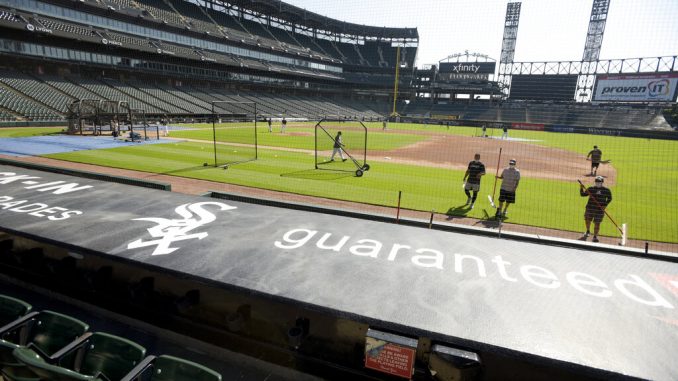
Two weeks after the originally scheduled date for the MLB All-Star Game, the baseball season is about to begin.
As it has with most of life, the coronavirus pandemic has scrambled the MLB season, sending players, staffs and fans on a roller coaster that included labor disputes that threatened to call the whole thing off, troubles with testing and a surreal summer camp held in socially distanced stadiums in the U.S. and Canada.
Now, the sport is set to embark on a regular season that could outdo everything we’ve seen so far in terms of unexpected oddities — a 60-game sprint to the finish.
With more than 100 games on each team’s schedule canceled, this short season could produce some odd results.
MLB adopted its current postseason model, with three division winners and the winner of a one-game wild card play-in game meeting in each league’s Divisional round, in 2012. In the eight seasons since, just over half of the teams leading a division at the 60-game point — an average of 3.1 out of the six division each year — went on to win the division title at season’s end. In no season did more than four of the six division leaders end up holding onto their lead.
On average 4.5 of the 10 playoff teams at the 60-game point held onto their position (as either division leader or wild card team) and 2.9 of the 10 teams in the playoff field at 60 games ended up missing the playoffs entirely.
Of the 16 teams to make the World Series over the last eight seasons, four teams — 25 percent — were not in the playoff field at the 60-game mark. That includes last season’s champion, the Washington Nationals.
In other words, assuming the shortened season reaches its endpoint, the teams that advance to the postseason would have had just about a coin flip of a chance of holding onto their spots in a regulation-length year. And there’s a one-in-four chance that at least one of the “true” World Series teams is heading home.
Unexpected winners are just one of the reasons this season will look like no other. There’s the fact that the entire minor leagues have been canceled. Teams will draw on replacements for injuries from a travel squad of 30-plus prospects who are working out near each team’s stadium, waiting for the call. There’s also the fact that MLB has created a special injured list for players who test positive for COVID-19, but teams don’t have to report that they’ve placed a player on the list — out of concerns for players’ privacy. That means beat writers will need to essentially take attendance to see if someone is missing from the clubhouse.
The odd rosters were scrambled even further by a small but significant number of players who chose to opt-out of playing this year out of fear of either contracting COVID-19 or passing it on to family members with health conditions. That list includes former Cy Young Award winner and former Durham Bulls pitcher David Price.
Between the opt-out players and the players who tested positive and have to miss time, several players find themselves with unexpected opportunities to make a big league roster. One of the best feel-good stories of the early season is former Tar Heel star Daniel Bard, who helped lead UNC to the 2006 College World Series then quickly reached the major leagues with Boston. Control problems seemed to force the premature end of Bard’s career, however. He last pitched in the majors in 2013 and last pitched in organized professional ball of any type in 2017, when he posted a 13.50 ERA with the Mets’ Double-A and Rookie Ball teams.
Now Bard is back, making the MLB roster for the Rockies.
Then there’s the Toronto Blue Jays. With the country of Canada blocking travel from the United States, the team had expected to play the season under strict quarantine restrictions, with nearly seven-digit fines for players caught outside of their hotel rooms in Toronto.
Instead, with less than a week to go until Opening Day, Canada pulled the plug on the Jays, leaving the team scrambling to find a place to play home games in the U.S. Early options included Toronto’s Florida spring training home of Dunedin. Buffalo, the minor league city located closest to Toronto, was also an early favorite, and even Charlotte was mentioned as a possibility, which would have allowed former Bulls manager Charlie Montoyo, now the skipper of the Jays, to return to the state where he won several International League titles with Durham, a couple hours from his longtime home park.
Instead, Toronto seems to be focusing on an MLB park to play its games, with Pittsburgh being the most likely candidate in what will amount to an odd timeshare with the Pirates.
For a mini-sized season, there are plenty of storylines to follow. It may not look like anything we’ve seen in the last century and a half of Major League Baseball, but the madness is ready to begin.
Play ball.
